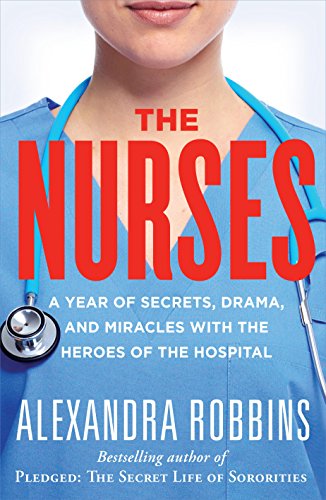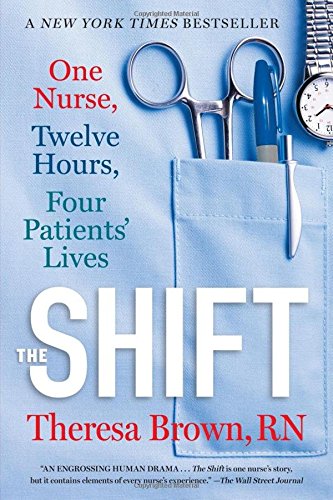
Reasons Why Admissions at Shift Change are Awful
- When a patient arrives at shift change, responsibility for the assessment is unclear. Is it me? Is in the oncoming nurse? What’s the cutoff? 6:55? 7:00? 7:05?
- Paging physicians to notify of arrival to the floor can become a fiasco especially when you are busy trying to complete admission assessments and get the chart ready for them.
- In never fails. When you get an admission at shift change, the patients almost never have an accurate medication list or their bottles. Good luck figuring out that white pill for their heart.
- There is often 100 family members in the room which makes asking personal and confidential health related questions impossible.
- The patient may be in pain, nauseated, annoyed, tired, and just plain frustrated and is tired of answering the questions they have already been asked at least twice before.
- It does not matter how much you have or haven’t done of the patient’s admission, the nurse receiving the new admission is always annoyed with you. I have actually stayed over an hour after my shift trying my best to get a patient admitted only to have the receiving nurse make a snarky comment about 1 medication that needed clarification!
- Receiving admissions at shift change make me feel rushed and like I will make an error or forget something important. I don’t feel I can perform the best care possible.
- If the physician happens to arrive while you are assessing the patient, all bets are off, and you’ll be there for a while. Firstly because you’ll have to stop doing your assessment so he can do his. Secondly, because he’ll often tell you verbal orders, elect not to write them as well, as since you received them you are responsible for completing them.
- The secretaries do not take responsibility for properly transferring phone calls and communications about patients during the shift change time, which can greatly delay the departure of the nurse whose shift is ending. For example: at 7:10, when you shift is done, and you are charting at the nurses station, if the Secretary blindly yells out “32 needs to go to radiology” in a demanding and callous tone, and the oncoming nurse completely ignores it, then what is the right thing to do? Should you be considerate and take the patient down, to be helpful to the receiving nurse? Would she do the same for you? Is it even a matter of courtesy/responsibility? These issues would not even come into play if it wasn’t for non-direct, yelling secretaries.
- An order for an NG tube at shift change is never a good thing.
I’m sure there are many more you can think of. Personally, I’d rather bathe a cat and then shower in lemon juice than take a patient at shift change.
What is it Like to Be a Nurse?
Nursing is tough. If you want someone else to get a glimpse into your world, including the perils of admissions and shift change, I recommend sharing with them one of the following books:
The Nurses: A Year of Secrets, Drama, and Miracles with the Heroes of the Hospital
This book is an impactful and honest look at what it’s like to be a nurse. I was also quoted in it! You can get it on Kindle or Paperback for a great price on Amazon.
The Shift: One Nurse, Twelve Hours, Four Patients’ Lives
Theresa Brown knows nursing. She lives and breathes it every day as even though she’s an epic writer, she’s still a practicing bedside nurse. This book is one of the best examples of what it’s like to work a nurse. This day in the life story is an impactful book that a nurse or those interesting in what nurses do should read. Get your copy on Amazon.
How do you feel about admissions at shift change? How about admissions or shift change in general?







Pingback: How to be the Unit's Favorite New Grad Nurse – FRESHRN
Speaking as an ER nurse leaving patients in the ED when they have a bed available to them is no safer than them going to a room at shift change. I can have up to 6 patients at a time when we are fully staffed. So when 1 patient is admitted and they may have already been in the ER for 5 hours I could have gotten any number of new patients in that time. By that time they are frustrated and uncomfortable and depending on their acuity level quite possibly in need of a nurse with less patients and more time to devote to them. We send patients up when they have a bed and someone to roll them up, end of storey
Melanie,
An occasional patient at shift change is going to happen. It seemed, however, that admissions at shift change were the rule rather than the exception. Both “sides” have a struggle in this. Finding the balance is the real key with this.
Rainscent Such a pain. It really irritates me when a nurse leaves and is like “I’m clocking out, you need anything?” as they literally walk away. Even if you do have questions or need more information they pretty much close off any chance at getting it.
Why would the supervisor take report and not attempt to help with some of the order and items she received? That’s no bueno.
DukeSells Perhaps it is time to teach them?
Working 3-11 PM in a sub-acute rehab, my unit gets lots of admissions…I can identify with ALL of your ‘pet peeves’ for why you dislike getting an admission @ shift change! Recently, a new admission was scheduled for my unit- the 7-3 pm nurse received the report from the hospital and gave me a verbal report of the new admit that was due to come @ 7pm. Patient arrived @ 9pm from hospital, and my supervisor took report from the MD for orders….long story short- I NEVER spoke to EITHER the hospital nurse who transferred patient, or the MD who gave the orders, BUT, it was I who was ULTMATELY responsible for this new admission, when we didn’t have the required pain meds for him on hand, nor did we have the right sized bed, or the kind of food he needed in house stock!
@Heathpears definitely, you’re not bed side nurse. Just smile and breathe. requires time and dedication to the patient and their family. how you do with 4 patient more in 3 hours before you start your med pass, YES WE DO, NURSES ARE AWESOME
When the ED is full and 2-3 emergent patients arrive and require beds immediately, the only option is to move patients that have a dispo to the floor and make those ED beds available. Most ED nurses have worked the floors and understand the issues with admitting patients during shift change but few floor nurses have worked in the ED and understand the need to move patients out of the ED regardless of the time.
@Mary Something that I think floor nurses fail to see is the big picture. I have worked on the floors and now in the ED and making a patient wait 45 minutes to go to the floor not only make them more uncomfortable on our less than comfy gurneys it also doesn’t allow us to being a patient from the waiting room back into the ED to be evaluated and get treatment started. Patients need to go to the floor when THEY are ready to go to the floor so the continuance of patient care in the ED can continue. I never realized how much holding a patient for shift change affects the ability of the ED to provide care for the many patients that come through our doors. If we have 6 patients waiting for 45 minutes to be admitted to the floors that means 6 patients in the waiting room have to wait 45 additional minutes to be seen by the ED staff.
@Mary I am with Mary….I wish we had “no transfers/admissions” during shift change…it is UNSAFE for pt’s. I work at a place where they will not pay you for overtime “unless you have a very heavy run” or it’s been really busy”, they will not pay you overtime to get your charting done. I have shift change at 1830 and my shift ends at 1900. I got a transfer the other day right at 1825. all I did was the VS and of course the BP was a little elevated (because of the move) so I gave the on coming RN the SBAR report and told her that the BP was elevated slightly and she would have to call the MD. My problem is the nursing supervisor (one in particular) doesn’t really care about pt safety. In fact I don’t think anyone in management cares about pt safety. If they did they sure as heck would not let any transfers/admissions happen during shift change. It is too chaotic to give report to 4 or 5 different nurses on 5 pts and take a new admission! The people making these policies need to come down and work on the floor for a few months, not just take their degree and get an office job. That is the worst, people making the policies that really have no idea how a floor works. With that being said it is extremely UNSAFE to transfer/admit pts during shift change.
I agree!
I agree, the best time to receive a patient is when the patient needs to be admitted. But this isn’t what always happens. Often time they will hang on to them until the end of their shift so they do not have to take a new patient….
The best time for an admission is when the patient is ready to be admitted – it IS after all, about them, not you. All the reasons you listed are about nursing culture and are things that can, and it sounds like, should, change. Everything you list suggests a break down of communication at shift change that places patients in danger. What actions can you take to improve this risk to patients and yourself?
I became a nurse practitioner mainly because of the stress involved with staff nursing. This is just one example of the stress involved with being a staff nurse. There is so much less physical stress as a nurse practitioner.
At the beginning of my career the guilt and so-called dedication to my patients would keep me there past my shift to 'finish what I started'.
Now..
I believe that nursing is a 24 hour job, and I can start an admission and hand off the remaining tasks to the oncoming shift without reservation.
I'm not 'dumping' on them in anyway, I do as much as I can with what time I have, but in the end we all have to work through the continuum of care.
imho
Mary-
The funny thing is ER make out like they have no idea its shift change. I mean seriously, whats waiting another 15 minutes to bring them up when they've been waiting hours already. I personally would much rather get an admission right when my shift started, verses any time withing the last hour or two of my shift. At least when they get there early, I have time to catch up.
I agree, it is not something that require a physician be bothered by in the middle of the night, but I believe the gems I often exchange report and patients with are just looking for something to be annoyed by. It sure feels that way.
Sarah-
Agreed! I suppose we cant designate a time frame, but if folks would be considerate on all ends of the spectrum, it would surely be a help.
I really hate feeling like I cant give a patient the full attention they deserve, especially when they first arrive, and likely are exhausted.
I hate admissions at shift change too! There's already enough chaos! I work nights and the best time for an admission is after midnight. By that time things have calmed down, meds are done, and I can sit with the patient, properly assess them, and give them the time they deserve. My main thing with admissions at shift change is making sure they are comfortable. I'll give them pain meds, Zofran, etc whatever they need to be comfortable because it's probably going to be a couple hours until I can get to them.
Our shifts are 6-6, and since there was so much complaining, there is no transfers/admissions during shift change (0545-0630). Although the intent is good…I really think it should be extended from 5-7, because otherwise there is too much confusion & proper care cannot be guarenteed (in my humble opinion). A proper admission cannot be completed in 15 min and most night shifts are blessed with a unit secretary at nights to put orders in or put the chart together.
And honestly, if you are working night shift and leave a medication clarification for day shift, THERE IS NOTHING WRONG WITH THAT, as long as it isn't something immediately needed. I do both days and nights, and to wake up a physician during night shift to clarify anything not dealing with cardiac, breathing, pain/nausea, is not neccesary.